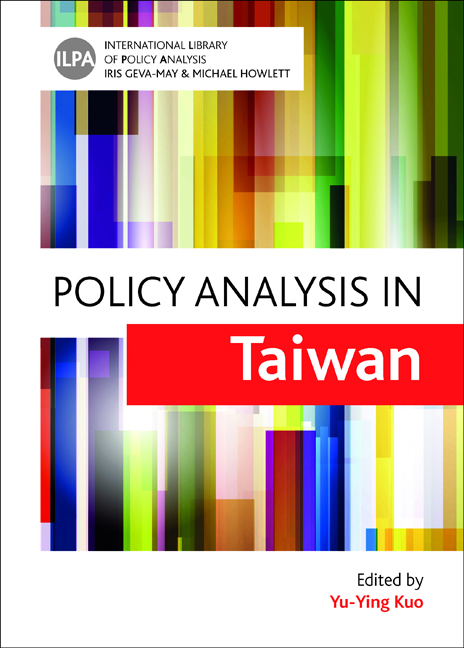Book contents
- Frontmatter
- Contents
- List of tables and figures
- Acknowledgements
- Notes on contributors
- One Policy analysis in a time of turbulence
- Two Exploring policy advisory committees in the central government
- Three Analysis of innovative local government policies in Taiwan
- Four Policy analysis in the legislative body: the legislative process of the Soil and Groundwater Pollution Remediation Act in Taiwan
- Five Policy analysis in the local councils
- Six Gendering policy analysis? The problems and pitfalls of participatory ‘gender impact assessment’
- Seven The power of influencing policies, or getting their share and more: interest groups in Taiwan
- Eight Think tanks in Taiwan
- Nine The development of public engagement in Taiwan
- Ten Social media and policy evolution in Taiwan
- Eleven Policy analysis by non-governmental organisations in Taiwan
- Twelve Policy network of universal healthcare reform in Taiwan
- Thirteen Public policy and administration research
- Fourteen Too critical to ignore? A tri-dimensional relationship examination of policy analysis internship in Taiwan
- Fifteen Policy analysis in Taiwan in an international perspective
- Sixteen Policy analysis education in Taiwan: a comparative perspective
- Index
Nine - The development of public engagement in Taiwan
Published online by Cambridge University Press: 11 March 2022
- Frontmatter
- Contents
- List of tables and figures
- Acknowledgements
- Notes on contributors
- One Policy analysis in a time of turbulence
- Two Exploring policy advisory committees in the central government
- Three Analysis of innovative local government policies in Taiwan
- Four Policy analysis in the legislative body: the legislative process of the Soil and Groundwater Pollution Remediation Act in Taiwan
- Five Policy analysis in the local councils
- Six Gendering policy analysis? The problems and pitfalls of participatory ‘gender impact assessment’
- Seven The power of influencing policies, or getting their share and more: interest groups in Taiwan
- Eight Think tanks in Taiwan
- Nine The development of public engagement in Taiwan
- Ten Social media and policy evolution in Taiwan
- Eleven Policy analysis by non-governmental organisations in Taiwan
- Twelve Policy network of universal healthcare reform in Taiwan
- Thirteen Public policy and administration research
- Fourteen Too critical to ignore? A tri-dimensional relationship examination of policy analysis internship in Taiwan
- Fifteen Policy analysis in Taiwan in an international perspective
- Sixteen Policy analysis education in Taiwan: a comparative perspective
- Index
Summary
Introduction
Active citizen participation is essential to a living democracy. Democratic governments use many mechanisms to solicit public input, ranging from one-way top-down communication to dialogue and two-way information exchange (Rowe and Frewer, 2000, 2004). Participation usually entails granting citizens the rights and opportunities to express their opinions, mobilise people and resources, and ultimately shape government decisions that have taken their interests and perspectives into account (Arnstein, 1969; Smith, 1993). Participation can enhance public opinion and ensure long-term commitment to collective problems such as the fight against terrorism (Kirlin and Kirlin, 2002).
Participation, as a deliberative rather than a rational approach, is considered more effective for policy issues that involve diverse interests and perspectives (Box, 1998; deLeon and Denhardt, 2000; Frederickson, 1982; Roberts, 2002; Vigoda, 2002). Citizen participation engages stakeholders in management and public policy making. A stakeholder can be defined as ‘any group or individual who can affect or is affected by the achievement of the organization's objectives’ (Freeman, 1984: 46). Stakeholders possess the power to influence policy making, give legitimacy to participation, call for the immediate attention of government or urgently demand government actions and policies (Mitchell et al, 1997). In the era of new governance, much attention has been paid to the development of new mechanisms to make sure that stakeholders’ voices are heard before government decisions are made (Bingham et al, 2005). Stakeholder representation has been proven to be positively associated with organisational accomplishments (Gazley et al, 2010). After all, as Crow and Baysha (2013: 304) argue, ‘policy making is not accepted as solely a government enterprise, stakeholders have begun to actively demand access to the policy process’. Even minority stakeholders can enhance their legitimacy and influence if they have the ability to mobilise collaboration and raise issues that are important to the majority (Drori and Weizmann, 2007).
Despite the importance of citizen and stakeholder participation that has been documented in previous research, the practice of participation has serious limitations. Not every citizen can participate easily. Citizens who become involved in public affairs are usually of higher socioeconomic status (Almond and Verba, 1963). Motivation, skills, and network connections are needed for engagement in public affairs (Verba et al, 1995).
- Type
- Chapter
- Information
- Policy Analysis in Taiwan , pp. 123 - 136Publisher: Bristol University PressPrint publication year: 2015



